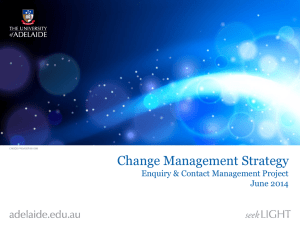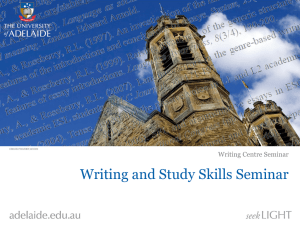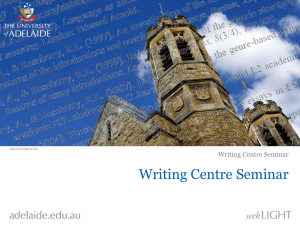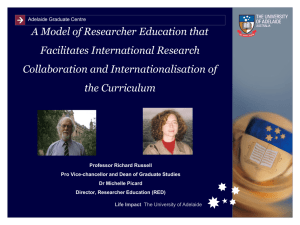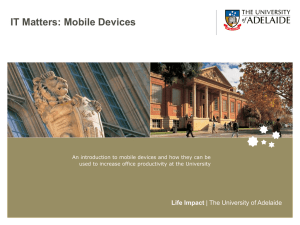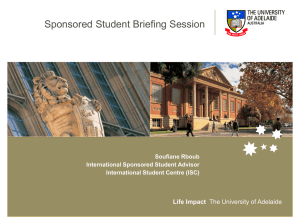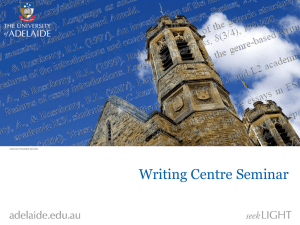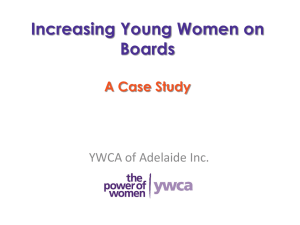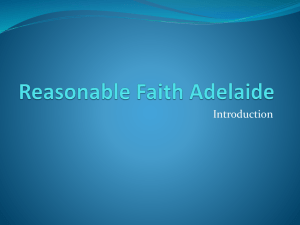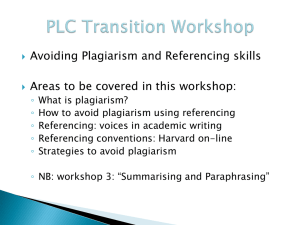Powerpoint slides from seminar
advertisement
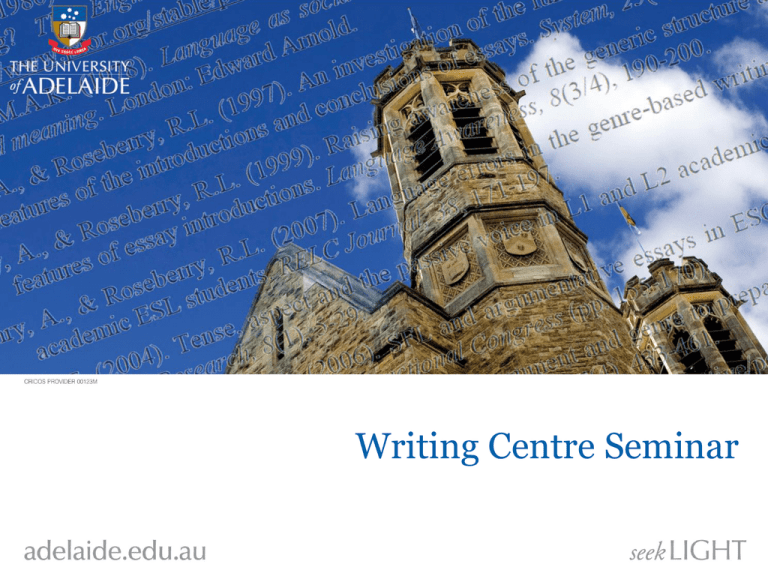
Writing Centre Seminar Studying in English Dr Jillian Schedneck Writing Centre Outline We will discuss how to become more confident in the following areas: • • • • Reading Writing Listening Speaking University of Adelaide 3 What will you be reading? Course profiles Journal articles Textbooks Book chapters Instructions Email communications Social media / Discussion boards University of Adelaide 4 Do your reading skills need improvement? • • • • Do you struggle to identify the main idea of articles? Do you read and reread articles to understand them? Do you have to pause to look up words often? Do you find that your own text resembles the original too closely when you try to paraphrase? University of Adelaide 5 What are strong readers like? • • • • • Are purpose drive, and can do targeted reading Know when to skim or concentrate deeply Can critique and analyse Can infer Can tell the difference between the main idea and supporting details Choose a few points from the list where you think you need to improve. University of Adelaide 6 What are strong readers like? • • • • • Don’t need to reread too many times Have general knowledge of word meanings Can pick up on word meanings from context clues Can Interpret and unpack instructions Can find relevant points Choose a few points from the list where you think you need to improve. University of Adelaide 7 Tips to become a strong reader • • • • • • • • • • • Read early Prioritize reading Preview before reading Skim first Identify most important readings Read only the abstract OR Read the abstract and the first sentence of each paragraph Read with a question/focus Read in the proper environment Take notes immediately (avoid highlighting) Be flexible about reading speed University of Adelaide 8 Ways to focus your reading Ask yourself these questions to focus your attention: • Why am I reading this? • What are the authors trying to do in writing this? • What are the authors saying that is relevant to what I want to find out? • How convincing is what the authors are saying? • In conclusion, what use can I make of this? University of Adelaide 9 Reading Resources to improve reading speed http://www.speedreadingcenter.com/the-best-speed-readingexercises/ http://mindbluff.com/askread.htm http://www.speedreadingcd.com/reading-test.htm University of Adelaide 10 What will you be writing? • Research essays • Lab reports • Critical reviews • Reflections • Annotated Bibliographies • Literature Reviews • Email communication • Group essays • PowerPoint slides • Interpretations of numerical data University of Adelaide 11 Do your English writing skills need improvement? • Do you struggle to put words down? • Is your text too close to an original source? • Are your sentences often too long and confusing to the reader? • Do you struggle to find the right tone? • Do you know how to write in the expected formal tone? • Do you have a wide vocabulary? • Do you have a strong sense of grammar? University of Adelaide 12 What do strong writers do? • • • • Their essays are understandable on first reading Their errors do not impede meaning Their writing answers the question / completes the task They give examples and generally explain and support their argument • They are curious and open to learn more about the subject Choose a few points from the list where you think you need to improve. University of Adelaide 13 What do strong writers do? • They are able to strategise and understand what tutors want to see in the assignment • Their essays have a logical structure • They are resilient, mistakes are not a major hurdle but a way to learn • Willing to revise • Willing to get help Choose a few points from the list where you think you need to improve. University of Adelaide 14 Grammar Skills—what to worry about ***Modal verbs: can, could, may, might, must, shall, should, will and would. University of Adelaide 15 Grammar resources • http://www.chompchomp.com/ Helpful grammar website • http://www.adelaide.edu.au/english-for-uni/ Created by Adelaide uni staff • http://www.perfect-english-grammar.com/modal-verbs.html All about modal verbs University of Adelaide 16 What will you be listening to? • lectures • peers • Instructions • Whole class discussions • One-on-one conversations • Recorded audio for courses University of Adelaide 17 Do your listening skills need improvement? • Can you follow the gist of conversations and reports on the media? • Do you miss the details when listening to television, radio, your teachers or the general public? • Do you have problems following Australian accents and informal conversations? • Do you have trouble understanding different accents? • Do you have difficulty identifying details? • Do you have difficulty differentiating between content and sentence fillers? University of Adelaide 18 What does a strong listener do? • • • • • • • • Gets main points, and signals they get it with active response Can rephrase main points Asks clarifying questions If lost, can regain conversation Doesn’t give up Picks up on word stress Understands instructions Familiar with a range of accents Choose a few points from the list where you think you need to improve. University of Adelaide 19 What does a strong listener do? • • • • • • • • • Manages communication breakdown Understands conversations with multiple contributors Can concentrate under distractions Follows meaning and changes Follows discourse markers Has note take strategies Able to understand some slang Anticipates meaning Practices listening Choose a few points from the list where you think you need to improve. University of Adelaide 20 Strong listeners are engaged and having fun! University of Adelaide 21 Tips to become a strong listener: verbal cues Start of lecture • Let’s start with . . . • The first thing . . . • Today we’ll be looking at . . . • I’d like to think about . . . Topic shifters • So let's turn to . . . • The next thing . . . • Now I'd like to consider . . . • Another important point is . . Summarisers • So now we can see . . . • What have we been looking at this afternoon? University of Adelaide Exemplifiers • One example is . . . • If we look at X we can see that Y... Qualifiers • This is true, but . . . • That's all very well, but . . . • Having said that, . . . • Although . . . • As far as we know . . . Asides • Where were we? • That reminds me of . . . 22 Improving your listening skills • Anxiety closes ears • Focus on what you get rather than what you miss • Cultivate an attitude of attentiveness • Recorded lectures on My Uni • Radio 5RPH on frequency 1197 (AM) for readings of The Advertiser and The Australian University of Adelaide 23 Tips to improve listening University of Adelaide 24 Listening self-access resources • Listen to Australian Programs with available scripts: http://www.abc.net.au/catalyst/stories/3847572.htm http://www.abc.net.au/btn/stories.htm • • • • Remove consecutive words from the script Listen to the program and try to fill in the missing words Do the same with songs Advantage: Distraction of visuals, music, etcetera reproduces real-life distractions University of Adelaide 25 Listening self-access resources Recognise Australian accents: • http://www.youtube.com/watch?v=X2zmNMjAOzw • http://www.fonetiks.org/engsou2au.html • Practice saying and recognising vowel and consonant sounds University of Adelaide 26 When will you be speaking? • Participating in tutorials • Speaking to lecturers / tutors about course • Speaking to peers • Giving presentations • Asking questions around campus • Talking to university resource providers University of Adelaide 27 Do your speaking skills need improvement? • Are you confident about your speaking abilities? • Are you worried that people won’t understand what you have to say? • Do you have trouble knowing when to add something to a discussion in a course? • Are you worried that you hesitate too long before speaking? University of Adelaide 28 What are strong speakers like? • Pronunciation doesn’t impede meaning • Enough vocabulary to communicate in the range of undergraduate tasks • Reasonable hesitation • Mostly correct word order • Reasonably correct tense • Mostly correct use of articles Choose a few points from the list where you think you need to improve. University of Adelaide 29 What are strong speakers like? • Confidence to speak, even if not said perfectly • Willing to express themselves, even if others don’t understand every word or a wrong word is used • Always practice English by asking questions • Listens to English language TV shows, news and podcasts as practice • Willing to make mistakes and correct them • Will to ask for help / confident that others want to help • Avoids insecurity Choose a few points from the list where you think you need to improve. University of Adelaide 30 Speaking self-access resources http://www.uiowa.edu/~acadtech/phonetics http://www.world-english.org/tonguetwisters.htm University of Adelaide 31 Writing Centre learning guides Active listening Articles in English Grammar Making Notes Learning at University Reading Effectively Practical Study Habits Participating in Tutorials Oral Presentations http://www.adelaide.edu.au/writingcentre/learning_guides/ University of Adelaide 32 Writing Centre Details WEB: FACEBOOK: EMAIL: PHONE: VISIT: www.adelaide.edu.au/writingcentre www.facebook.com/WritingCentreUofA writingcentre@adelaide.edu.au 8313 3021 Level 3 Hub Central, 10am-4pm Mon-Fri
